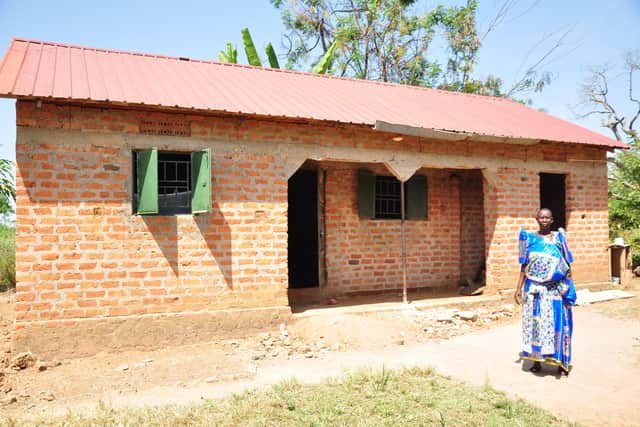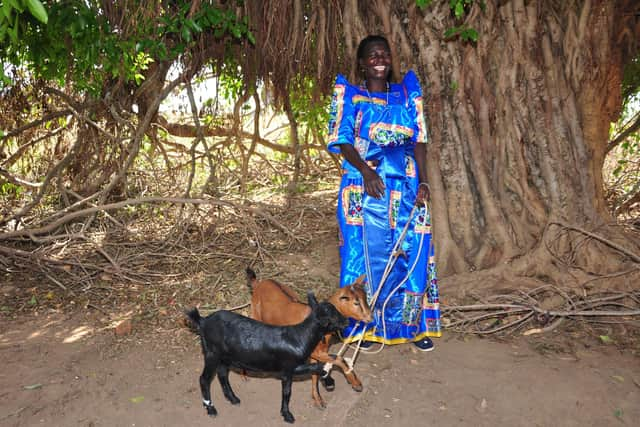The charity helping Ugandan farmers to help themselves


There’s the new brick house with tin roof she’s built, a massive improvement on her old home, a rudimentary, grass-roofed mud structure prone to rat infestations.
She shows us her kitchen in another building, proud as punch of her two-pot Lorena stove, an innovative design which requires only a small amount of firewood and has a chimney, drawing smoke outside, a saviour for her eyes.
Advertisement
Hide AdAdvertisement
Hide AdOutside her cow takes shade under a squat tree. There are chickens, goats, corn cobs drying in the sun, a magnificent mango tree.


Life for Agnes has improved beyond measure, thanks in no small part to the work of Self Help Africa, the charity formerly known as War on Want.
I travelled over 6,500 miles to the Teso sub region of Eastern Uganda to see first hand the life-changing work of the charity.
It’s a journey that takes us through the impossibly chaotic capital Kampala, its streets thronging with hawkers, crazy traffic congestion, boda bodas, the motorbike taxis that snake dangerously through the city’s arteries, and desperate, desperate poverty.
Advertisement
Hide AdAdvertisement
Hide AdThe sights are mind-boggling. Rickety-looking lorries double as taxis with crowds of people clinging precariously atop; a snappably-thin man transports a sofa on the back of his pushbike; another has two live goats riding pillion. Images that could have been lifted straight from the pages of National Geographic.


Passing ramshackle towns and villages on pot-holed red-dirt roads, which turn to mud baths when it rains, we arrive at Ngora to meet Agnes, who is part of the Aingang Eidunyet Women’s group - the name translates as ‘Support your Neighbour’ and this is exactly what this collection of women are doing with the upmost wholeheartedness.
The 30-strong group of female farmers, dressed beautifully in resplendent blue dresses (their group uniform), welcome us effusively with singing, dancing hugs and infectious smiles. It is clear they are indebted to Self Help Africa for giving them the skills to flourish.
In Uganda, women shoulder the primary responsibilities for childcare and play a central role in the agricultural sector, engaging in a myriad of ways as producers, labourers, marketers, and entrepreneurs.
Advertisement
Hide AdAdvertisement
Hide AdThe Aingang Eidunyet Women’s group is just one of 15 collectives which Self Help Africa supports through training, education and financial assistance, for this is a region with a dark past and plenty of present challenges, not least climate change.
The area is still recovering from the ravages inflicted by a brutal rebel movement, the Lord’s Resistance Army, led by Joseph Kony. In 2003 the group sowed terror in northern Uganda, killing civilians and abducting and enslaving children to be rebel soldiers.
People fled their homes, taking refuge in squalid ‘protection camps’.
Eithne McNulty, Self Help Africa NI’s overseas officer said: ‘‘People were in the camps for so many years, they were unskilled, disempowered and used to hand outs. They didn’t know how to work the land, didn’t know the boundaries of their land, didn’t know where their farms were, so they were coming back to all of that lack of structure and lack of any kind of authority.’’
Advertisement
Hide AdAdvertisement
Hide AdThey were also dirt poor, many living on just 10p a day. The hunger season in the region can be as long as four or five months in some less fortunate communities, with March, April, May and part of June as the critical months.
‘‘It’s dry, you can’t plant anything, nothing can grow and food supplies are running short,’’ said Eithne.
‘‘Our ambition is that during the hunger months people will have at least two meals a day. People are telling us that they will struggle during May and early June, the food supplies will have diminished. It’s been a bad year because of water logging, so they lost a lot of crops.’’
As its name suggests, Self Help Africa is about educating people to become self sufficient. It has instigated Elum (Ecological Land Use Management) Centres - literally training centres for the group. These are hosted by one farmer in the group and they have demonstrations from Self Help Africa on how to save water, how to irrigate crops, how to grow a kitchen garden.
Advertisement
Hide AdAdvertisement
Hide Ad‘‘There is no point in giving people seeds for their kitchen gardens if they don’t know what to do with them,’’ said Eithne.
‘‘We spend a lot of time training the farmers on good agri-economic practices and good marketing practice. It’s about education, it’s about going in there to help build their capacity.’’
Agnes has learnt so much from the charity she jokes she’s like a ‘‘schoolgirl’’.
‘‘Formerly, we had lost hope, but when we came into a group, we are now very active, now we are doing things, we are very happy. It is good to share ideas with people. Now, I have everything, I have all the vegetables. I pick and cook.’’
Advertisement
Hide AdAdvertisement
Hide AdOther women in the group are eager to share their experiences and their successes.
Harriet said before the formation of the group in 2013 they were ‘‘badly off’’ in their families.
‘‘Life was very difficult. This group has eased our life.’’
Self Help Africa taught the women how to save their money, so that collectively, as a group, they have bought eight sheep with their savings, some have even bought cows for themselves. In the future they hope each member will each have her own sheep. Their food stores are plentiful too, with a good supply of sorghum (a grass species cultivated for its grain) and ground nuts.
Another farmer, Agwang, said: ‘‘Some of us did not have houses, some did not have any businesses for survival and some did not have mattresses, but now all the members have at least mattresses and most of the members have small-scale businesses (selling tomatoes, silver fish, avocados or cow peas) that we can survive on. Most of us have built houses.
Advertisement
Hide AdAdvertisement
Hide Ad‘‘Some of us can hire gardens that we can cultivate, sell the produce and get a living. Some of the crops can be retained for home consumption. We can now afford to put our children in school and plant trees.’’
Thanks to the intervention most households now also have toilets and a tap. The women have also been taught how to cook nutritious food for their families. The main crops grown in the region include sorghum, cassava, ground nuts, cow peas, sweet potatoes, maize and finger millet. All are at the mercy of climate change and pests and diseases (neighbouring Kenya is currently dealing with a locust infestation).
Denny Elliott, head, Self Help Africa NI, said: ‘‘The area will be scorched now for a few months, then the rains are meant to come, but if they don’t come and you’re trying to get ready for ploughing, there is no point opening land with the oxen we’ve given the communities, if it isn’t going to rain.’’
Each farming group is based on a five-committee model, which includes marketing, procurement, advocacy, monitoring and evaluation, and a village saving and loans association (VSLA) - which becomes a huge part of how people manage and survive.
Advertisement
Hide AdAdvertisement
Hide AdEithne said: ‘‘The idea is that long after we are gone that structure will remain in the community and they will able to self-manage; it’s almost like a mini co-operative. They appoint their own officers, they keep their own records.’’
Gender-based violence is a huge problem in the region; it is thought to affect one in two women. Self Help Africa has introduced a novel programme called Gender Action Learning System (GALS) which aims to tackle the scourge.
‘‘Self Help Africa focuses on empowering women because they are the future,’’ said Eithne.
‘‘It’s been statistically and research-proven that if you give resources to a woman, those resources will find their way inside the family household. If you give them to the man, it is much less likely that the children and the family will benefit.
Advertisement
Hide AdAdvertisement
Hide Ad‘‘The GALS methodology works at the household level, with the woman and the man and together, they’ll plan what they’ll save, what they’ll borrow, how they will spend the borrowing. One of the welcome offshoots is that domestic violence is reduced because there is a much better understanding by the man of what exactly is happening within the family. It is a really powerful tool.’’
The farmers I met in the Aingang Eidunyet Women’s group contend with insanely tough conditions, yet they are joyous, strong and entrepreneurial. My overriding memory is of their generosity and heartfelt gratitude. They are women planning and saving, taking charge and progressing. It was completely humbling and unbelievably inspiring to meet them.
l Our Self Help Africa series continues on Monday with a visit to a group living with HIV. If you would like to donate to the charity visit their website, www.selfhelpafrica.org.